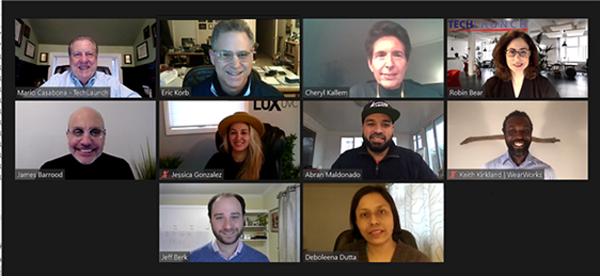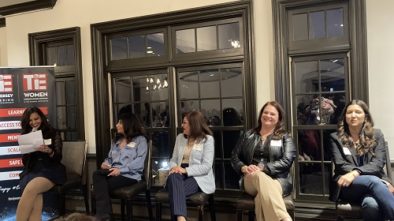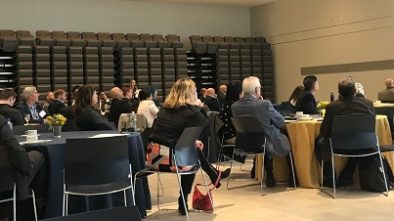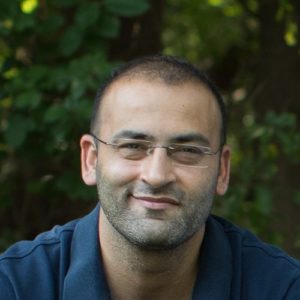At March BullPen, Winner Tripkicks Helps Companies Restart Business Travel after the Pandemic
We must be turning the corner on the pandemic when a travel application can win a serious pitch competition.
That’s what happened at the TechLaunch BullPen on March 18, when Tripkicks (New York), an add-on for business travel programs that provides actionable insights for trips, guidance on appropriate spending and behavior, and an enhanced traveler experience, won the investor panel’s endorsement.
The win comes with approximately $15,000 in professional services from TechLaunch’s sponsors and the guarantee of pitching slots at upcoming meetings of Jumpstart NJ Angel Network (New Brunswick) and the VC investment group Tech Council Ventures (Summit).
The event was kicked off by Mario Casabona, TechLaunch founder and managing director, who later in the event noted that the BullPen was more than just a pitching event.
“This event that we’re having is really a culmination of the business accelerator program. We accept applications. And then we choose five semifinalists. We mentor them, prepare them and then we choose the three that end up presenting here. So, it’s not just a pitch competition. The semifinalists and the finalists actually get mentoring and coaching in preparation for this event.”
Tripkicks
Tripkicks CEO Jeff Berk concentrated his presentation on the features that would help companies restart business travel. The stakes have never been higher, he noted, as executives are pressuring travel managers to make sure trips are both smooth and safe. However, corporate booking tools lack the information that travelers now need, such as entry restrictions, testing requirements, changing visa regulations and conditions at their destinations.
“Our algorithm aggregates, categorizes, prioritizes and displays information across a variety of different categories, like the ones mentioned, in addition to health and safety information; company-specific messages; and supplier information like cleanliness rankings, on-time arrivals and environmentally friendly policies — which has actually become a key focus for travel programs,” he said.
Berk had some statistics to demonstrate his company’s success, including a pipeline of prospects that was enviable. “Our conversations are extremely positive, and they’re accelerating as we get closer to travel. And we’re tracking ahead of our plan for the year.” He added that direct sales are focused on travel managers at large and mid-size companies, but it’s really the corporate travel agencies and platforms like SAP Concur (Bellevue, Wash.) that influence company decision-making. He noted his good success in partnering with them.
An audience member asked how Berk would use the proceeds from his fundraising, and he said that he would be beefing up sales because “right now, we can’t address all of the incoming sales inquiries. We’re having to pick and choose.”
One of the judges, serial entrepreneur and founder of LuxUVC Jessica Gonzalez, said that as a stickler for design, she wanted Berk to show the user experience of the product during his presentation.
WearWorks
Another presenter was Keith Kirkland, cofounder of New York-based WearWorks, who pitched his haptic technology-based wearable device called “Wayband,” which helped a blind runner finish a marathon. The $249 device gently guides wearers to walk or run in a “virtual haptic corridor,” without needing a map.
“We’ve tested this on thousands of people, and 90 percent of people can figure out the correct way to go within 10 seconds without any instructions. It’s that intuitive,” he said. The device has patents which, he mentioned, were filed by Gearhart Law, a Summit-based patent law firm and TechLaunch sponsor.
WearWorks is also involved in developing other applications for haptic technologies. Although the company is located in New York, Kirkland participated in the Rutgers University Black and Latino Tech Initiative, a pre-accelerator program developed and sponsored by The Center for Urban Entrepreneurship & Economic Development, at Rutgers Business School. The company has won design awards and been the subject of a TED talk that has 1.8 million views.
“Working with the blind is only the beginning of our journey,” Kirkland said. He noted that he’s exploring opportunities with baseball players, researchers, game developers, runners, hikers and skiers for when new adaptations of the technology become available. He added that haptic technology can be used for things other than navigation, for example, headphones. “We believe we can become the haptic hardware platform that is affordable.”
The company’s pricing strategy, which involves a low device cost and a subscription, drew some comments from the audience. Kirkland noted that there is income diversity in the blind and visually impaired community, and that he didn’t want to force someone to buy an expensive device and then pay a couple of hundred dollars a year for service. “We felt like we can make a device that’s much less expensive and much more accessible.”
Another judge, Cheryl Kallem, managing director at Golden Seeds (New York), an angel group that invests in early-stage women-led ventures, noted that Kirkland presented a hocky stick depiction of the company’s growth. “I always get nervous when I see increases like that.” James Barrood, former New Jersey Tech Council CEO, who was also on the panel, suggested that Kirkland leverage his partners to get their expertise, as it is a niche market. He noted that Kirkland had listed the venture capital firm SOSV (Princeton) as a partner, and remarked that SOSV has accelerators in China.
Viora Health
Representing Philadelphia-based Viora Health was Deboleena Dutta, founder and CEO. The company is taking an empowerment approach to whole health, based on the philosophy of “teach a person how to fish,” she said. “Our mission is to improve health by proactively identifying and addressing the social and behavioral factors. Our HIPAA [Health Insurance Portability and Accountability Act]-compliant engagement solution is delivered using a text-based mobile application. We use predictive algorithms to (1) select patients for the right program, (2) identify barriers, (3) personalize a plan to close barriers and (4) offer automated and human support,” she said.
“Our secret sauce is that we combine data science with behavioral science and facilitation to create an environment where patients can be empowered,” she told the judges.
The company has completed an extensive customer discovery to validate the market opportunity, with 250 stakeholder interviews, 410 patient surveys, three data sets analyzed and one paid proof of concept. “What we learned is patients do not buy in, they do not feel in charge and there’s no visibility to their declining health at home” without personalized intervention, she said. A pilot program “achieved 80 percent retention, which is three times that of in-person programs; 5 percent weight loss; reduced blood glucose; and $12,000 in revenue,” she told the judges.
An audience member asked about the adoption of mobile technology by seniors and minorities, and she answered that about 70 percent of this population under Medicaid have access to smartphones. She also noted that Viora doesn’t ask anyone to download anything.
Panelist Abran Maldonado, cofounder of Create Labs Ventures (New York), commented that he couldn’t tell what the user experience was like based on the presentation, and that he would have preferred to get a sense of the interaction between the case manager and the patient.
TechLaunch sponsors include Jumpstart NJ Angel Network, Tech Council Ventures, Gibbons (Newark), Withum (Princeton), Gearhart Law; and Casabona Ventures (Kinnelon). Robin Bear, founder of Robin Bear Consulting, in Madison, emceed the evening, and Eric Korb produced the webinar.




